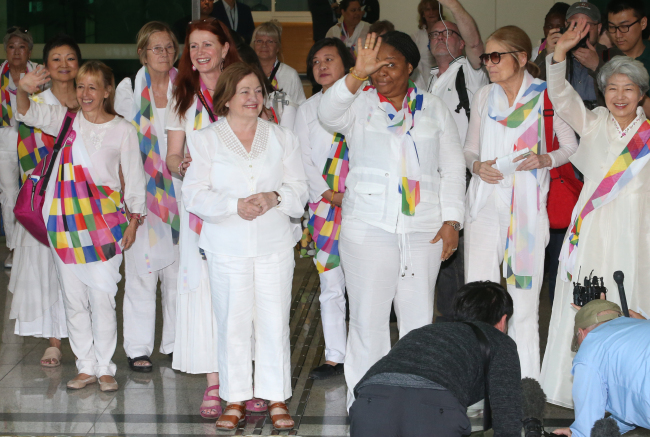A group of foreign women activists crossed the heavily fortified inter-Korean border from North Korea on Sunday, voicing hope for peace and reconciliation for a divided peninsula.
About 30 female activists from around the world, including U.S. activist Gloria Steinem and Nobel Peace Prize laureate Mairead Maguire, marched down from the North to the South across the Demilitarized Zone (DMZ) to mark the International Women’s Day for Disarmament.
 |
| About 30 female activists from around the world, including U.S. activist Gloria Steinem and Nobel Peace Prize laureate Mairead Maguire, marched down from the North to the South across the Demilitarized Zone (DMZ) to mark the International Women’s Day for Disarmament on Sunday (Yonhap). |
The DMZ, which bisects the Korean Peninsula, is a 259-kilometer-long and 4-kilometer-wide strip of rugged no-man’s land stretching from coast to coast, serving as a legacy of the 1950-53 Korean War that ended in a truce, not a peace treaty.
“We are feeling very positive (about) what we’ve accomplished … which is a trip for peace, for reconciliation and for human rights and a trip to which both governments agreed,” Steinem told a press conference in South Korea. “We were able to be citizens’ diplomats.”
She voiced hope that their move could become the beginning of contacts across the “artificial barrier” to promote peace and understanding between the two Koreas.
The group arrived in Pyongyang on Tuesday to meet with North Korean women to deliver their message and marched down to the South via the western corridor along the Gyeongui railway.
Originally, they planned to walk through the truce village of Panmunjom, which sits in the middle of the DMZ. But they had to change plans by accepting Seoul’s recommendation to march through the western land route.
The truce village sits in the middle of the DMZ, which is guarded by stone-faced soldiers on each side of the military demarcation line. Passing through the truce village is a violation of the truce treaty, according to the United Nations Command.
“We’ve come here to (help) end war. I think that it is the first step in a right direction,” said Leymah Gbowee, who won the Nobel Peace Prize in 2011 for her role in leading a Liberian women’s movement that helped bring an end to her country’s brutal civil war.
She said the activists feel “privileged” to be able to come across the DMZ, but they also feel sad as there are so many families separated by the Korean War.
The activists said that the purpose of the DMZ crossing is to express hope that Korean families separated by the Korean War will be united someday and military tensions between the two sides can be reduced.
But some critics claimed that the event would not help resolve North Korea’s nuclear weapons program and human rights violation.
The peace march also met with criticism here as anti-Pyongyang activists claimed that the female activists have pro-Pyongyang stances, citing a report by the North’s media. A group of conservative activists held a rally in front of Imjingak, a park near the border to protest against them.
North Korea’s Rodong Sinmun, the communist party’s official newspaper, reported last week that they “praised” the North’s late founder Kim Il-sung at his birthplace. (Yonhap)

